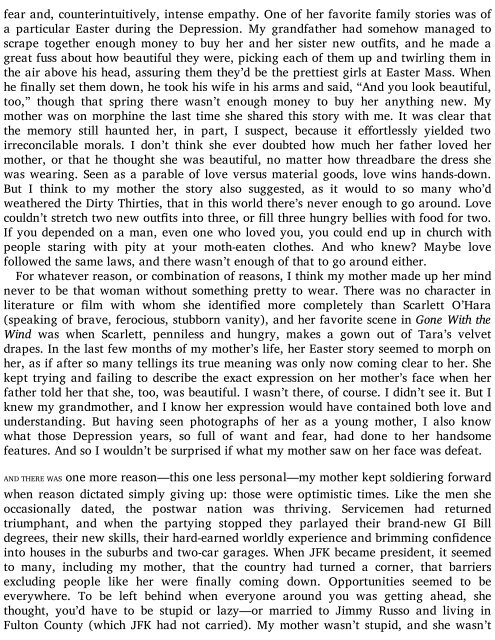8956825209375
You also want an ePaper? Increase the reach of your titles
YUMPU automatically turns print PDFs into web optimized ePapers that Google loves.
fear and, counterintuitively, intense empathy. One of her favorite family stories was of<br />
a particular Easter during the Depression. My grandfather had somehow managed to<br />
scrape together enough money to buy her and her sister new outts, and he made a<br />
great fuss about how beautiful they were, picking each of them up and twirling them in<br />
the air above his head, assuring them they’d be the prettiest girls at Easter Mass. When<br />
he nally set them down, he took his wife in his arms and said, “And you look beautiful,<br />
too,” though that spring there wasn’t enough money to buy her anything new. My<br />
mother was on morphine the last time she shared this story with me. It was clear that<br />
the memory still haunted her, in part, I suspect, because it eortlessly yielded two<br />
irreconcilable morals. I don’t think she ever doubted how much her father loved her<br />
mother, or that he thought she was beautiful, no matter how threadbare the dress she<br />
was wearing. Seen as a parable of love versus material goods, love wins hands-down.<br />
But I think to my mother the story also suggested, as it would to so many who’d<br />
weathered the Dirty Thirties, that in this world there’s never enough to go around. Love<br />
couldn’t stretch two new outts into three, or ll three hungry bellies with food for two.<br />
If you depended on a man, even one who loved you, you could end up in church with<br />
people staring with pity at your moth-eaten clothes. And who knew? Maybe love<br />
followed the same laws, and there wasn’t enough of that to go around either.<br />
For whatever reason, or combination of reasons, I think my mother made up her mind<br />
never to be that woman without something pretty to wear. There was no character in<br />
literature or lm with whom she identied more completely than Scarlett O’Hara<br />
(speaking of brave, ferocious, stubborn vanity), and her favorite scene in Gone With the<br />
Wind was when Scarlett, penniless and hungry, makes a gown out of Tara’s velvet<br />
drapes. In the last few months of my mother’s life, her Easter story seemed to morph on<br />
her, as if after so many tellings its true meaning was only now coming clear to her. She<br />
kept trying and failing to describe the exact expression on her mother’s face when her<br />
father told her that she, too, was beautiful. I wasn’t there, of course. I didn’t see it. But I<br />
knew my grandmother, and I know her expression would have contained both love and<br />
understanding. But having seen photographs of her as a young mother, I also know<br />
what those Depression years, so full of want and fear, had done to her handsome<br />
features. And so I wouldn’t be surprised if what my mother saw on her face was defeat.<br />
AND THERE WAS one more reason—this one less personal—my mother kept soldiering forward<br />
when reason dictated simply giving up: those were optimistic times. Like the men she<br />
occasionally dated, the postwar nation was thriving. Servicemen had returned<br />
triumphant, and when the partying stopped they parlayed their brand-new GI Bill<br />
degrees, their new skills, their hard-earned worldly experience and brimming condence<br />
into houses in the suburbs and two-car garages. When JFK became president, it seemed<br />
to many, including my mother, that the country had turned a corner, that barriers<br />
excluding people like her were nally coming down. Opportunities seemed to be<br />
everywhere. To be left behind when everyone around you was getting ahead, she<br />
thought, you’d have to be stupid or lazy—or married to Jimmy Russo and living in<br />
Fulton County (which JFK had not carried). My mother wasn’t stupid, and she wasn’t

















